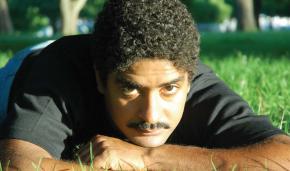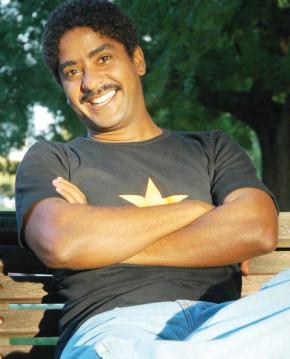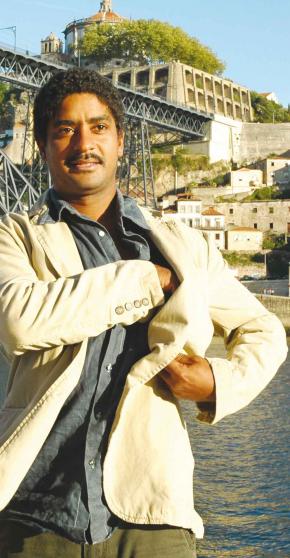Raúl Rosário, Life is ever a stage
Living with Raul is like watching a non-stop show. Gestures, speech patterns, facial expressions, his (…) air, he’s a boy on stage all the time. There’s never any shortage of stories when he is around. His charm never lets go of you. In true Angolan fashion, everything came together – the excitement for life, the wide range of views, his instinct for theatre, and the smile instead of the tear. It all converged to create the talent that is Raul Rosário.
He’s Angolan, an actor, 35 years old, his mother a military nurse and his father an agricultural engineer. He was born in Benguela in the Benfica district and when he was 4 his family left for Luanda. He lived in Belgrade, in Yugoslavia for some time and it was here that he first came into contact with drama and the circus. On his return, a neighbour from Prenda, who had a farm and owned the Luanda horse-riding company, started him on horseback. Since then he has never lost his passion for horses, and was an instructor for 10 years.
He studied at the Karl Marx Institute in Makarenco, and it was from here that his interest in art dates. His father, however, advised him to get a qualification in electricity. When he was 17, he failed his exams and at 18 was doing military service. His training was at the Comandante Raúl Argueles school (“by coincidence, this was the name of my street in Prenda, though I was given the name Raúl because of a doctor friend of my mother’s”). Being in the military was not plain sailing. His platoon had to go into Mavinga, an area of heavy fighting. But his good humour never left him: “in the barracks, when there was nothing to do, I would start telling stories, mucking around, inventing things. I was always interested in films and in good acting. I wanted to know what made a good actor.”
When he left the army, it was election time “and it looked as if there was going to be peace”. But war came to Luanda in 1992. “All of this awoke my political conscience. I had travelled the country; I believed that we couldn’t go around killing each other. I never wanted anything more to do with guns and I chose to do something constructive.” The roads to freedom are set out before us. His first work was in “Equus”, produced by Maria João Ganga. From here, more work followed in the Elinga Theatre.
 “At that time I was still in the early stage of the struggle, and this period was more a question of personal satisfaction. I liked to feel cosseted after doing a play, but I wanted to learn about the theatre.” Then the chance came in 1997 to go on tour to Cape Verde, Évora and the Almada festival in Portugal with “Sequeira Luís Lopes ou o Mulato dos Prodígios” (Sequeira Luís Lopes or The Half-Caste Who Did Wonders), directed by Rogério de Carvalho. For the first time he was working alongside professional actors from Portugal and Brazil. He realised that acting was a serious career and you could make a living from it. He was tempted to become as much a professional as he could.
“At that time I was still in the early stage of the struggle, and this period was more a question of personal satisfaction. I liked to feel cosseted after doing a play, but I wanted to learn about the theatre.” Then the chance came in 1997 to go on tour to Cape Verde, Évora and the Almada festival in Portugal with “Sequeira Luís Lopes ou o Mulato dos Prodígios” (Sequeira Luís Lopes or The Half-Caste Who Did Wonders), directed by Rogério de Carvalho. For the first time he was working alongside professional actors from Portugal and Brazil. He realised that acting was a serious career and you could make a living from it. He was tempted to become as much a professional as he could.
After the “Navegar é Preciso” (Sailing is Needed) project in São Paulo, and the play “Na Nzuá e Amirá”, text and staging by Mena Abrantes, he is invited to take part in Expo 98 in Portugal (and in 1995 in Italy). Raul stays in Portugal for some time. He joins the Escola da Noite in Coimbra and plays in “Os Persas” (“The Persians”) by Esquilo (staged by Pierre Volts) and in “Jacques e o seu amo” (Jacques and his master”) by Milan Kundera, staged by Sílvia Brito.
Stage becomes more than a school for him. It becomes the school. When he puts a part together, he does his historical and biographical research. “I try to identify as much as possible. In the theatre we are always learning – to sing, to dance, to say things forcefully and to see the world in relative terms, looking at it from many different angles”, he says. Raúl learns a softer touch: “I felt there were obstacles in Portugal, but they were in my own way of being. When I did the children’s theatre “O Embondeiro que Sonhava Pássaros” (The Embondeiro Tree that Dreamed Birds) by Mia Couto, I had to sing for the children, but I had come from Angola so stiff, and it was difficult for me, but I lightened up and now I can do all sorts of things.”
In 2000 he returns to Angola. “I was a little queasy when I came back. In Europe I felt a real pull to where my roots were. I had lived here for so long and now I was back with so much experience. I wanted to show people other things.” As soon as he was back he noticed the lack of professionalism but he refused to do anything different. The first of three girls has arrived and he insists on staying in the theatre and doing other things connected to it.
His first contact with television is through a piece by Oscar Gil, Caminhos Cruzados (Paths Crossing), where he plays the emblematic figure of Kito. It was a great success and won the Angolan national culture and arts award. He went on to play the part of the mechanic in the series Sede de Viver (Hunger for Life) and in Entre o crime e a paixão, both produced by TPA (Angolan television). His experience in the cinema came with O Herói (The Hero) by Zezé Gamboa and Cidade Vazia (Empty City) by Maria João Ganga in 2003. He began to become famous as the bad guy.
 He gained immense experience in the theatre by playing 16 different roles in Woza Albert by the South African Percy Mtwa, produced by Miguel Hurst and co-starring Orlando Sérgio. He met friends and actors in Portugal when he was on tour in Yerma by Garcia Lorca, produced by Mena Abrantes. In 2005 he returns to Angolan authors with Quantas Madrugadas tem a Noite (The Night has So Many Early Mornings) by Ondjaki. Discovering the theatre became his craft and his pleasure.
He gained immense experience in the theatre by playing 16 different roles in Woza Albert by the South African Percy Mtwa, produced by Miguel Hurst and co-starring Orlando Sérgio. He met friends and actors in Portugal when he was on tour in Yerma by Garcia Lorca, produced by Mena Abrantes. In 2005 he returns to Angolan authors with Quantas Madrugadas tem a Noite (The Night has So Many Early Mornings) by Ondjaki. Discovering the theatre became his craft and his pleasure.
Raúl makes an urgent appeal for professionalism. “We have to be more professional. We need the government, through the Ministry of Culture. We who create the art must fight to bring culture to a wider public, we must link the theatre to other performing and visual arts. One measure is fundamental: schools, now.”
 He has a deep belief in the land where he lives and is bent on improving things. He maintains that new things can be put together. It’s a natural process, because creating starts from being who you are. “The theatre is a form of expression that is born with man. A child will ask for something and turn it into theatre. Then, when we grow, we live through what is around us. I lived through the war in Angola. If I had been in Portugal I would be different. So theatre in Angola will not be the same as in Portugal.” And he picks South Africa as an example of the good results that come from a mixture of the traditional and the modern. This is artistic creation on its own terms, and good schools for the performing arts.
He has a deep belief in the land where he lives and is bent on improving things. He maintains that new things can be put together. It’s a natural process, because creating starts from being who you are. “The theatre is a form of expression that is born with man. A child will ask for something and turn it into theatre. Then, when we grow, we live through what is around us. I lived through the war in Angola. If I had been in Portugal I would be different. So theatre in Angola will not be the same as in Portugal.” And he picks South Africa as an example of the good results that come from a mixture of the traditional and the modern. This is artistic creation on its own terms, and good schools for the performing arts.
It is well-known that talent is in no short supply among Angolans: “we have people with great potential so it is sad that they cannot find a follow-up, contact with the theatre, of every kind, African and around the world.”
in AUSTRAL nº70, article provided by TAAG - Linhas Aéreas de Angola